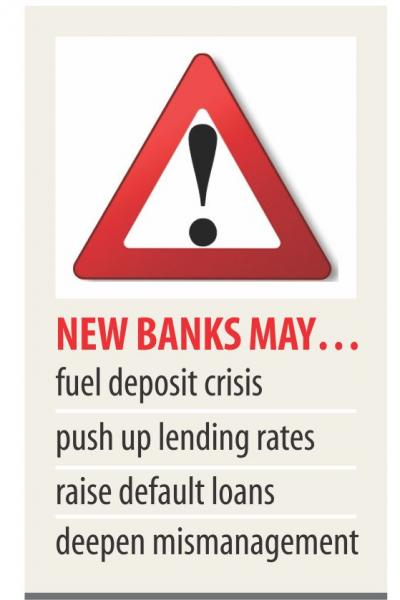New banks will only add to woes

The entry of the three new banks will weaken the banking sector further by putting additional pressure on supervision, auditing and deposits, said experts yesterday.
The banking sector is already in trouble due to lack of good governance and instead of addressing the problems new banks were allowed in, said Ahsan H Mansur, executive director of the Policy Research Institute.
“They will just increase mismanagement in the industry,” he said, adding that the sector is handicapped for lack of skilled manpower.
Many banks are facing difficulties in getting quality hires for the posts of managing directors and deputy managing directors.
“In this situation, there is little chance for the new banks to do well. They will bring nothing different in terms of customer service -- rather they will contribute to rising default loans.”
At the end of September last year, total non-performing loans stood at Tk 99,370 crore, which was 11.45 percent of all outstanding loans.
Despite initial reservations, the central bank on Sunday gave nod to three new banks -- upon pressure from the finance ministry.
Bengal Bank, People's Bank and Citizen Bank will soon set up shop, taking the total number of banks to 62.
All three new banks have connections to the Awami League government. The Bengal Group of Industries is the sponsor of Bengal Bank. AL lawmaker Morshed Alam is the chairman of the group and his younger brother Jashim Uddin is the chairman of the proposed bank.
MA Kashem, an AL leader in the US, is the chairman of the proposed People's Bank, while Jahanara Huq, mother of Law Minister Anisul Huq, is the chairman of Citizen Bank.
Salehuddin Ahmed, former governor of Bangladesh Bank, echoed the same as Mansur. “The new banks will do nothing special. Rather, they will add to the central bank's monitoring and auditing burden,” he added.
AB Mirza Azizul Islam, a former finance adviser to a caretaker government, stressed on the superfluous nature of the latest government move.
The existing number of banks -- at 59 -- is already too high in comparison to the size of the economy, he said. “More banks will make the banking sector's health worse.”
The deposit growth is already declining due to lack of confidence of savers on banks.
“The new banks will intensify the deposit crisis, pushing up the interest rate. As a result, the interest rate for lending will go up too, raising the risks for default loans,” he added.
The experts' pessimism surrounding the advent of the new banks is further fuelled by the performance of the last batch that got licences -- also on political consideration -- in 2013. “Most of the nine banks that got licences could not perform well and are involved in irregularities,” Ahmed said.
Two of them -- Farmers Bank and NRB Commercial Bank -- are in a bad state because of default loans and a lack of corporate governance.
But Finance Minster AHM Mustafa Kamal yesterday defended the decision of giving licence to more banks.
“The central bank allowed more banks definitely based on necessity. The number of banks does not matter. If there is demand and the banks can provide service it does not matter how many banks are allowed to operate in the market,” he told reporters at the secretariat.
The state of non-performing loans is the main concern for the banking sector.
“We are trying to find a way to give banks relief from the high default loans,” he said, adding that the troubled banks will be merged if necessary.
